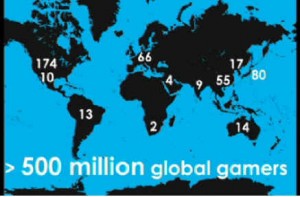In the previous post I wrote about Jane McGonigal and her views on how gamers can save the world. Well, Jesse Schell, game designer, teacher, and author, has a slightly different take on the increasingly prominent role that games will play in the future in a spring 2010 DICE talk (available here via TED). He draws a line from the recent spate of reality-fudging games like the Wii Fit, Guitar Hero, and Mafia Wars (indeed he takes Facebook games as his starting point) to a future where game-like point systems are in place for everything from brushing your teeth longer to taking public transport to getting to work on time.
Schell’s vision of the future seems more plausible than McGonigal’s and in that sense it is more frightening. But both actually see their visions as ultimately leading to improvements–using gamer energy and ideas to solve problems in the case of McGonigal, and using increased monitoring by sensors to improve personal behavior in the case of Schell. Interesting ideas and interesting optimism. Of course, one might succumb to a moment of skepticism and point out the many weapons that were meant to end wars or gifts to mankind that ended up causing more problems than they helped, or refer people to the darker versions of state and/or corporate control contained in books such as 1984. But it’s probably better to be optimistic about the future since we (collectively) don’t exactly have the option of whether to go there or not.

